16+ SAMPLE Actor Contract
-
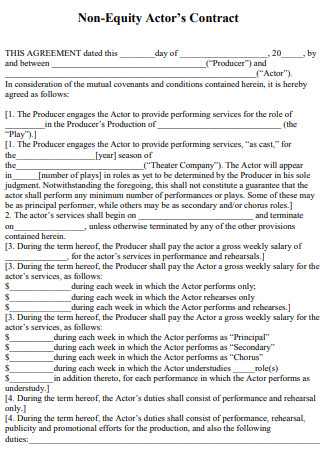
Non-Equity Actor Contract
download now -
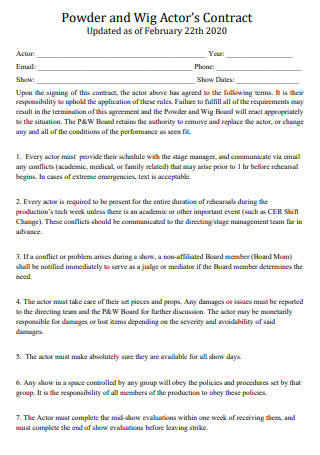
Powder and Wig Actor Contract
download now -

One Act Play Actor Contract
download now -
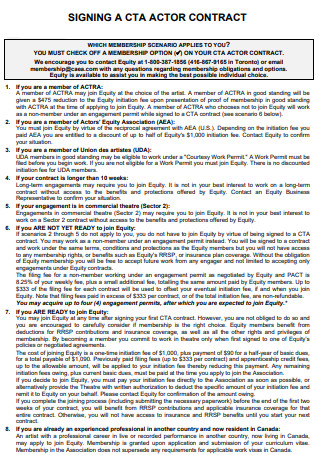
Signing Actor Contract
download now -
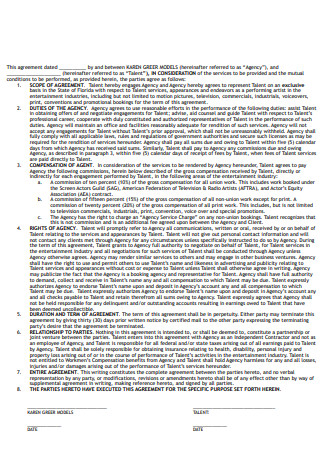
Sample Actor Contract
download now -

Actor Contract And Cancellation Policy
download now -
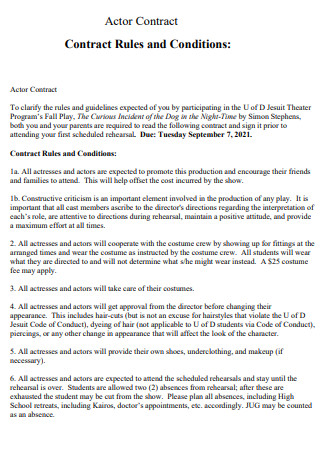
High School Academy Actor Contract
download now -
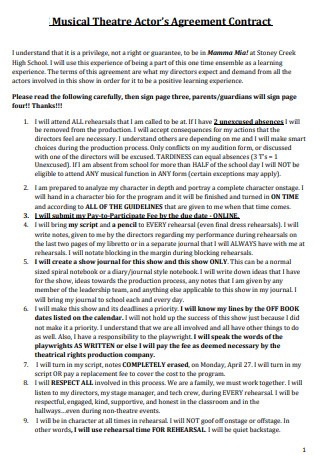
Musical Theatre Actor Contract
download now -
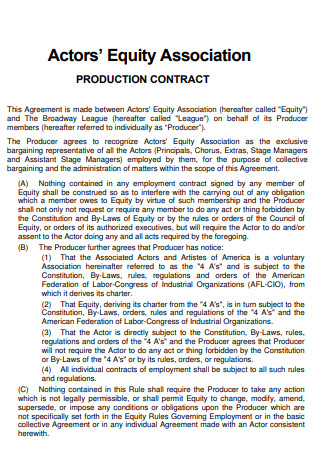
Actor Equity Association Contract
download now -
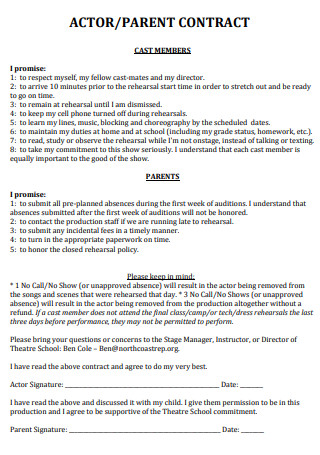
Actor Parent Contract
download now -
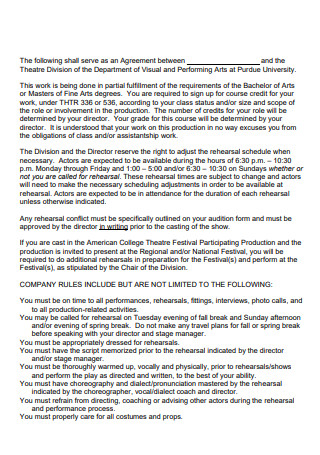
Simple Actor Contract
download now -

Basic Actor Contract
download now -
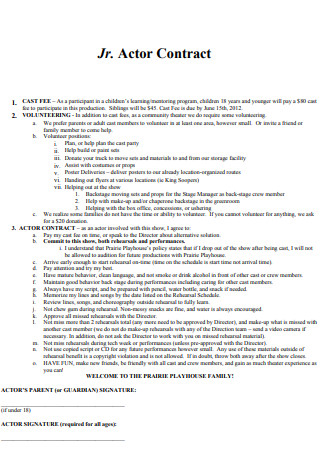
Jr Actor Contract
download now -
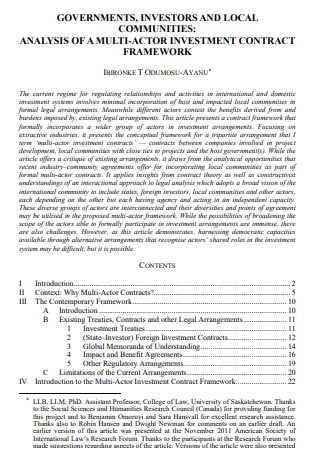
Multi Actor Investment Contract
download now -
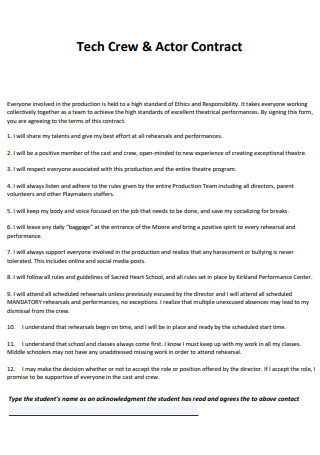
Tech Crew Actor Contract
download now -
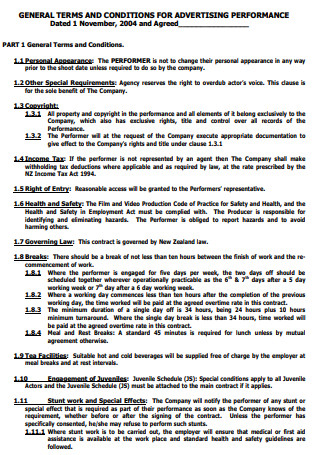
Actor Performance Contract
download now -
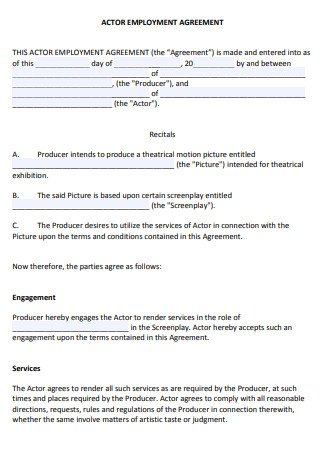
Actor Employement Contract
download now
FREE Actor Contract s to Download
16+ SAMPLE Actor Contract
What Is an Actor Contract?
What Is the Importance of Actor Contract?
What Is an Actor?
What Are the Several Acting Techniques?
What Are the Types of Actors?
What to Include in an Actor Contract:
FAQs
What happens if an actor breaks a contract?
Are actors considered contractors or employees?
Do actors work under a company?
How much do actors get paid for small movies?
What benefits do actors get?
Do actors work for free?
Generally, it is important to know the certain rules and responsibilities before actually becoming an actor. One thing is reading through an Actor Contract to get a wider understanding of this kind of industry.
What Is an Actor Contract?
A contract is there to protect the producer and to protect the actor. Actor contract is an agreement between different parties that’s meant to be enforceable by law if the agreement is broken. A contract makes sure there is as much clarity as possible between both partners so both know what to expect from the other. You should always use a contract with your actors no matter how informal the shoot. It will save you from the consequences of any misunderstandings or disagreements further down the line. At bare minimum, a producer will pay for travel and food expenses, provide a copy of the finished film and provide Public Liability Insurance to cover the crew and cast for any accidents during the production. The production team strongly urge actors to retain these elements to the contract, even if you amend or remove other clauses.
Film contracts and agreements protect the rights of your film and are necessary to avoid miscommunication and risk at every stage from pre-production to distribution. Agreements need to be set in place with your production team, cast and crew even from before principal photography begins.
What Is the Importance of Actor Contract?
The importance of an actor contract is to formalize new relationships and outline the various legal obligations each party owes to the other. Contracts are finalized every second of every day. For businesses in particular, contracts act as a vital tool for building new relationships, extending existing ones and closing transactions. Once signed, this contractual agreement creates a promise that certain rights and obligations will be fulfilled by each party. In essence, a promise is at the heart of every contract.
Furthermore, actor contracts perform various important business functions, making them critical business documents for many organizations. This kind of contract function as a reliable record of the rights, responsibilities, and obligations of the parties who have signed it. A contract will protect you in the event of wrongdoing. Not only will a contract empower you to take legal action if the terms you agreed to are violated, but it will also explain which jurisdiction you can take this action under, and what steps to take to do so.
What Is an Actor?
Actors are people who entertain an audience by acting, singing or dancing. An actor’s job is to fully represent the character they are playing and to convince their audience that character is real by engaging them and drawing them into the story. There are many ways to get into character and actors often research the jobs, hobbies, or activities of the characters they play so they are able to put themselves in that frame of mind. This applies to major roles and smaller parts, as all roles combine to create a successful production. Moreover, physical appearance can be important in creating a character as well, and actors will often lose or gain weight, or change their hair color to physically create the character they are playing. In addition, if the part demands any kind of emotional drama, an actor often researches people who have experienced what the storyline depicts in order to realistically understand and convey the emotions involved. They play characters on stage or screen and work with the direction of the creative team to bring a piece of theater to life.
There are many actors who make a successful career out of so-called bit parts, and never have a starring role, which can still be a very satisfying career. Others who achieve great success very early on in their careers become household names, and get many major roles. Here are some responsibilities of an actor:
- Perform other duties laid out in the job description depending on the kind of show
- Perform the show to an audience
- Use props and costume during the performance
- Attend technical and dress rehearsals
- Attend costume fittings
- Attend all rehearsals scheduled
- Take direction from the Director and/or Choreographer
- Work with other Performers
- Learn lines, songs and/or dances
- Research the play/character
What Are the Several Acting Techniques?
The following is a list of acting techniques that actors use nowadays:
Classical Acting Technique. An acting technique that has a systematic approach to training actors. This focuses on concentration, physical skills, voice, emotion memory, observation, and dramatic analysis. Moreover, the actor puts himself or herself in the mindset of the characters finding things in common to give a more accurate portrayal of the character.
Method Acting Technique. This emphasizes the practice of connecting to a character by drawing on personal emotions and memories, aided by a set of exercises and practices, including sense memory and affective memory. This is also described as a form of acting where the actor becomes the character or tries to live the role in life somehow literally. Additionally, method techniques used by actors force them to imagine themselves with the thoughts and emotions of their characters to develop lifelike performances.
The Chekhov Acting Technique. This is a psycho-social approach to acting and it focuses on working with impulse, on transformation, imagination, and inner and outer movements. In addition, the actor physicalizes a character’s need or internal dynamic in the form of an external gesture. The outward gesture is suppressed and incorporated internally, allowing the physical memory to inform the performance on an unconscious level
Meisner Acting Technique. This type of acting method makes the actor’s scene seem more authentic to the audience. This requires the actor to focus not on themselves but entirely on the other actor as though he or she is real and only exists at the moment. The Meisner acting technique teach principles that help them find their expression in other people’s responses.
What Are the Types of Actors?
Roles can vary by contract and in some cases, actors can negotiate the way they are credited, from series leads to cameos. Here are some classifications that overview the various types of acting roles in television:
What to Include in an Actor Contract:
Each specific acting contract may contain different terms and provisions based on the needs of the circumstances. However, a sound acting contract should include the following information:
Step 1: Term of Employment
This will identify the start-dates and end-dates of the acting employment. Depending on the nature of the production, these dates may be pre-set, or contingent upon other events. The contract may require that the actor commit to a number of years of employment if the TV show is picked-up for multiple seasons. It is important for an actor to be aware of the potential time commitment they are agreeing to before signing the acting contract.
Step 2: Compensation Rates
The contract should clarify if the actor is being paid flat rate, hourly, per performance, or percentage of proceeds. Compensation may be negotiable, and it may be appropriate for the actor to request that they receive compensation equal to the best rate being paid to other actors with similar roles.
Step 3: Whether the Contract is Exclusive
An employer may wish to prohibit an actor from appearing in other productions during the term of the job, and sometimes even afterward. This portion of the contract may limit the actor’s rights to engage in other employment.
Step 4: Whether the Actor Must Give Up Their Name and Likeness
This clause is intended to record the actor’s consent to appear in the acting production as well for any other identified purposes. The contract will request that the actor provide rights to the employer to use the actor’s name and image for the acting job, as well as for any other promotional or merchandising purposes.
Step 5: Merchandising
Depending on the acting job, there may be merchandising potential for the feature. This clause is similar to the clause detailing whether the actor must give up their name and likeness. This could include merchandise such as t-shirts, posters, action figures, books, etc.
Step 6: Who Handles Promotion and Publicity
An acting job may require the actor to appear at other events outside of the acting production itself. An example of this would be how an actor may be required to appear at certain premier events, talk shows, or other events as needed to publicize the production.
Step 7: Need of Public Liability Insurance
Actors should ensure that their employer has them covered by insurance. The employer may detail that they have obtained public liability insurance in order to protect the actor in the event of any accidents on-set.
Step 8: Travel Expenses and Wardrobe
Actors may wish to ensure that the contract specifies whether such costs are covered by the employer. Meanwhile, if the employer is providing the wardrobe, the actor may be able to negotiate terms allowing the actor to keep the wardrobe once the production is complete.
Step 9: The Remedial Clause
An acting contract should specify what constitutes a breach of the contract, and what remedial measures should be taken in the event of a breach.
FAQs
What happens if an actor breaks a contract?
If they breach their contract, they open themselves up to a potential civil suit. But if the contract states they can back out of a movie for certain reasons, and specific situations occur, they may be well within their rights. It is all in the contract they sign. If an actor breaches an employment contract altogether, they could lose the value of the contract entirely. Additionally, they would be liable for other expenses incurred by their employer as result of the breach.
Are actors considered contractors or employees?
It is often difficult to determine which classification to use. The IRS view is that most crew members, actors, and others working on a film production should be classified as employees, not independent contractors, and that taxes should thus be withheld. Generally, actors would be considered to be employees — the company that hires them exercises a great deal of control over what they do: the company (or director) tells them when to start, when to stop, what to say and what to do.
Do actors work under a company?
If actors happen to own the company that is producing one of their films, then it is their own company that pays them for their acting work. Actors are paid through the production companies that make the films in which they appear.
How much do actors get paid for small movies?
Depending on the contract, it can be as little as $50/day to $150-$200/day. It depends on a lot of things. Non-union short films are usually passion projects where actors often work for free or only get fed or are paid a nominal $50-$150/day.
What benefits do actors get?
Aside from the minimum salaries, including overtime, pay for additional duties, housing and/or per diem while touring. Health insurance and pension plan, 401(k), supplemental workers’ compensation insurance. Contract negotiation and administration. Work rules, vacation and sick pay, Actors also get improve public speaking skills, the acting increases a teamwork mentality, they get to improve their confidence, they become more physically active, their memorization increases, and being in drama and on stage improves professionalism.
Do actors work for free?
An actor never truly works for free. They tirelessly give their time, their craft, and their entire being to every role. However, some professional actors work for scale on low budget indie films because they have such a strong desire to work on a project where they most likely find the script interesting.
When negotiating your contract as an actor, remember that you are always going to be the most trustworthy person looking out for your own best interests. It is essential to do your research, pay attention, make sure you understand everything that is going on and do not be afraid to ask difficult questions. Just know that any agreement you see is naturally going to be very pro-production company—the more leverage you have in your career, the more potential you will have to reverse that balance.
Before you sign anything, review the acting contract on both your computer screen and in printed hard-copy form—it is likely items will jump out at you from the physical document that you did not notice via your screen. Make sure to read the entire contract, even if you need to take periodic breaks to get through it. Grab your highlighter, and dedicate yourself to marking everything you think is vague or do not fully understand.
